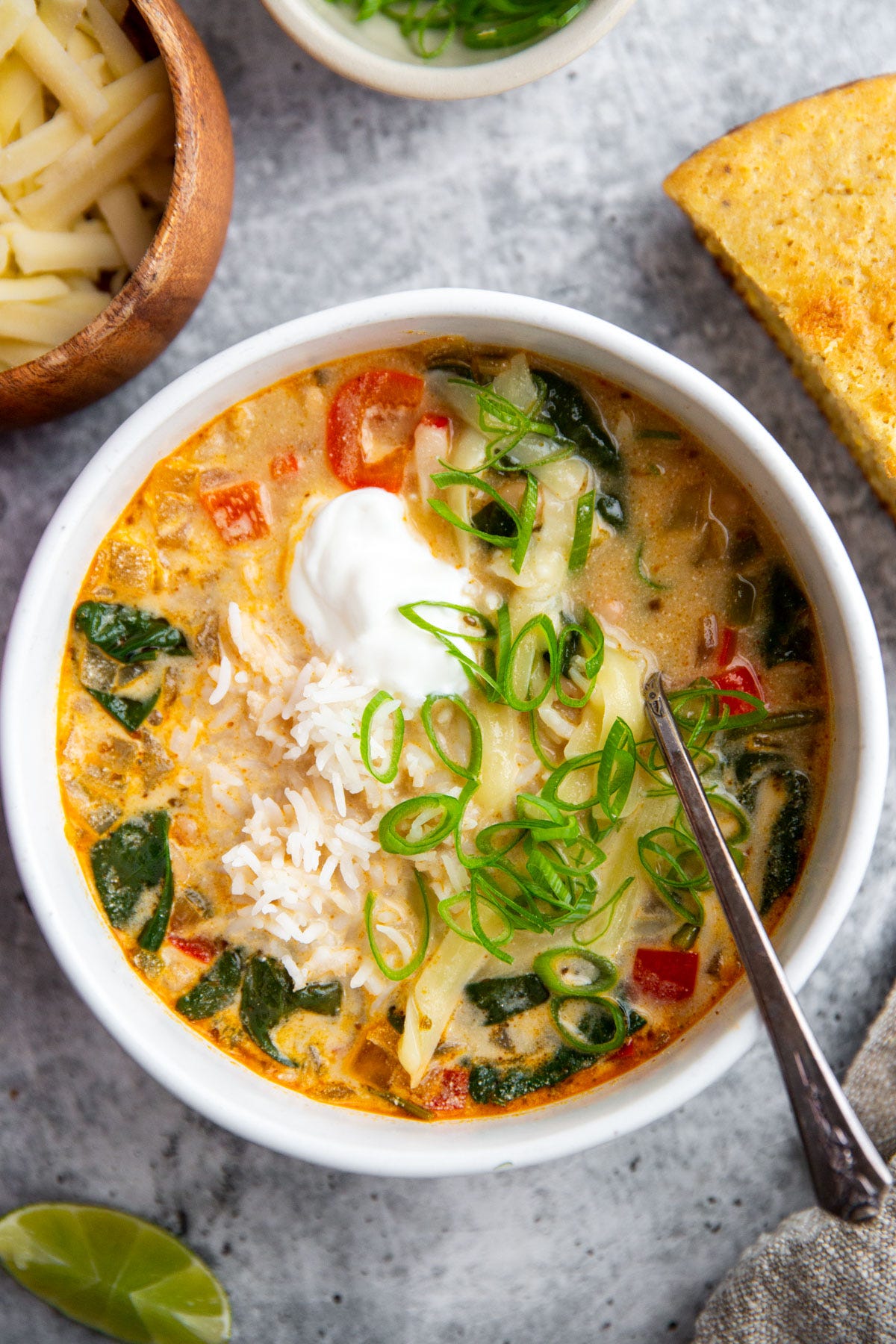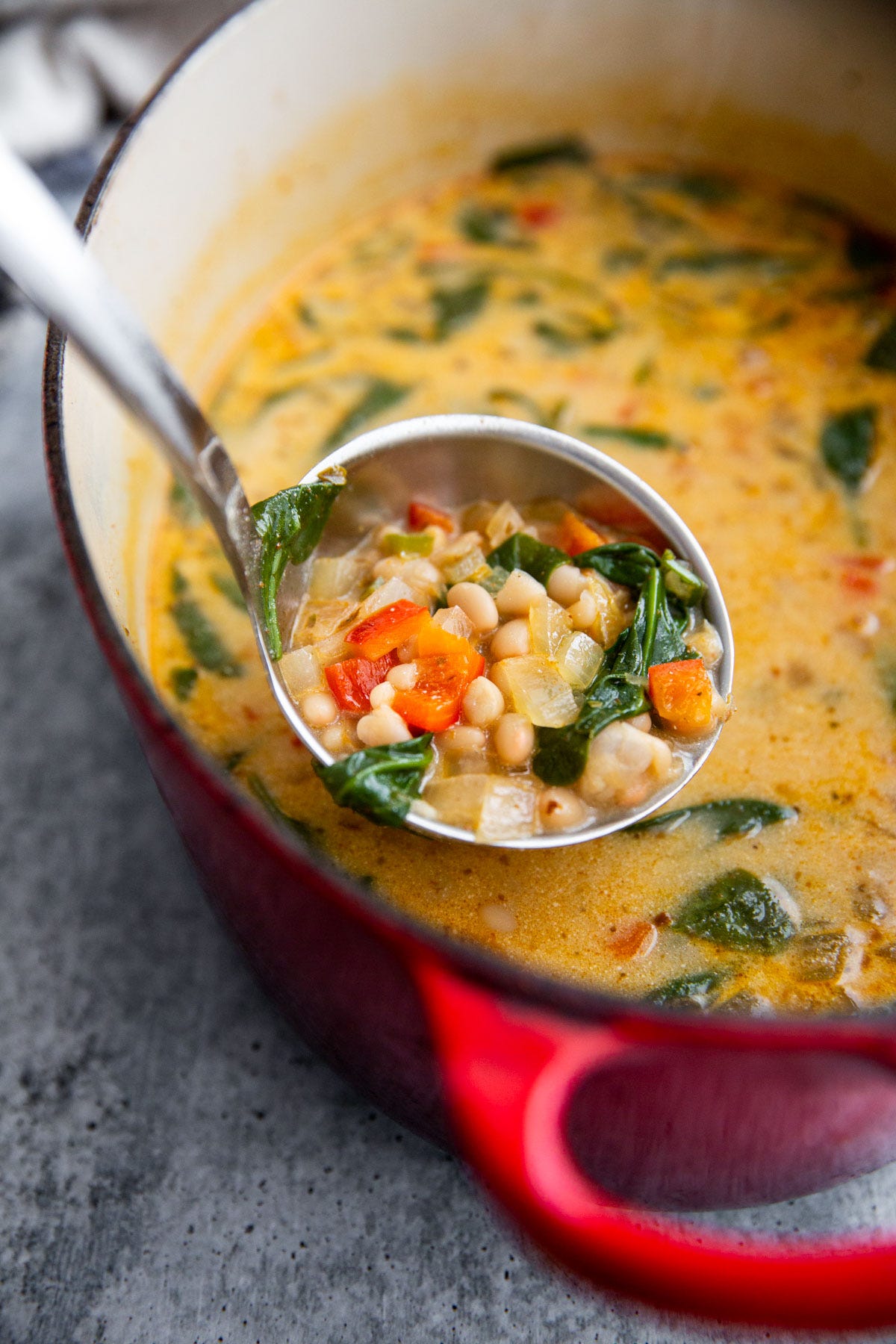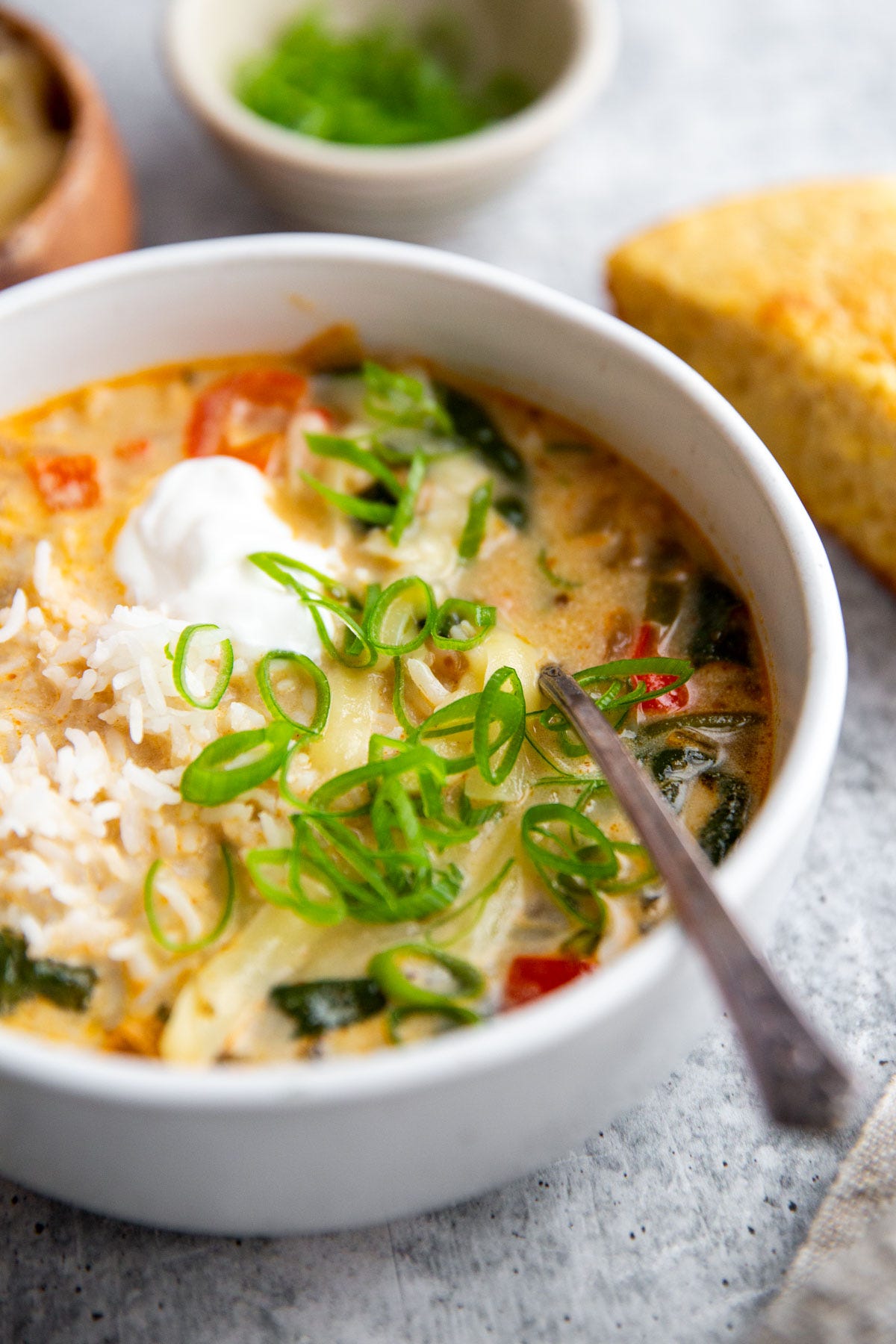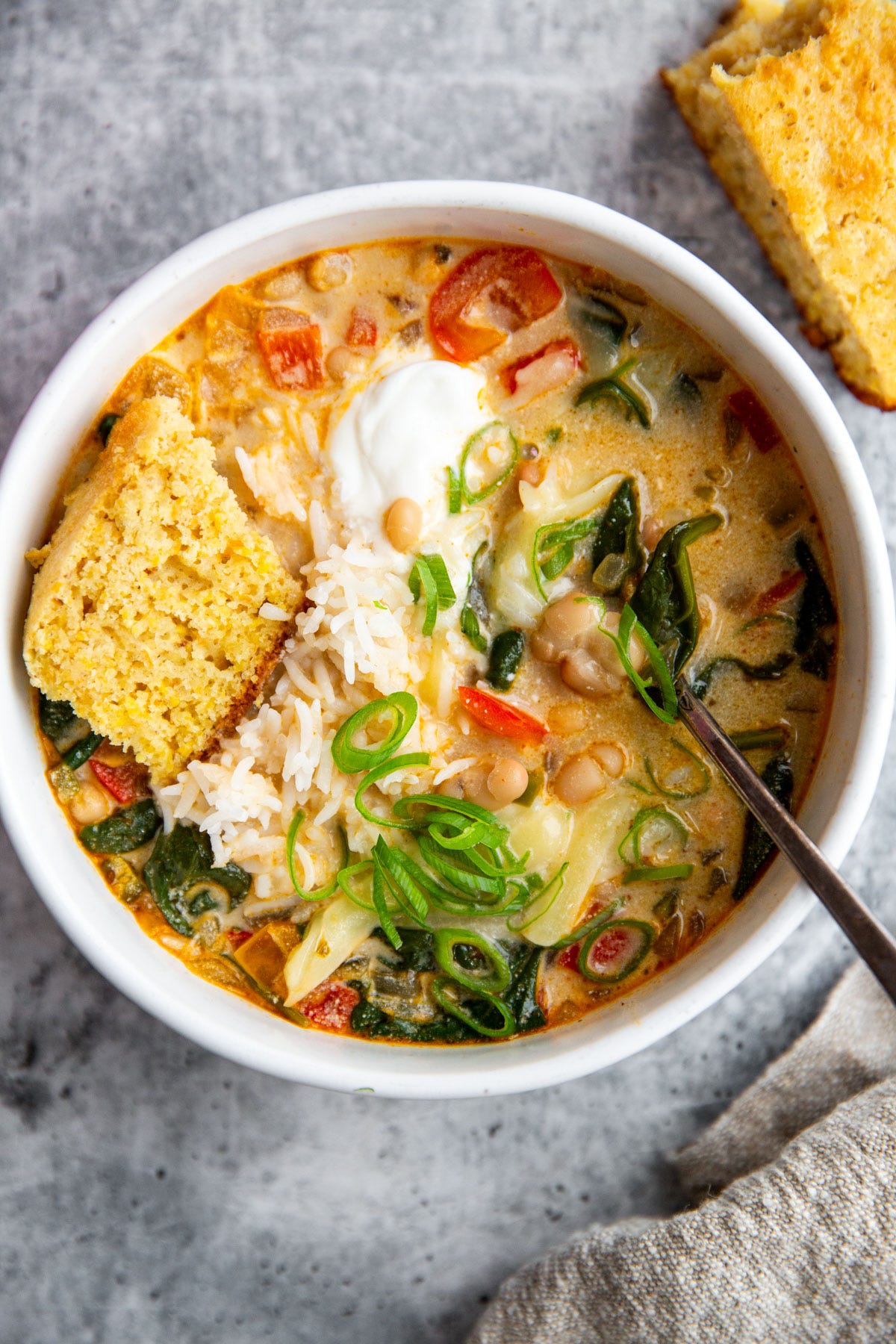Happy Friday, friends! Today I have the coziest soup recipe for you, and it comes together in about 30 minutes. We’re making a light and creamy white bean soup, which gets robust flavor from a few simple spices, as well as brightness from spinach and lime. It’s topped with all the things (because toppings are everything), and is the kind of meal you’ll want to slip into on a blustery day. Before we get into the recipe, I want to talk about noise. As in, the noise in our heads.
Thank you to all of you who voted on the best day to send these emails! 76% of you voted for Fridays, so I will keep the emails as they’ve been. I had mentioned that I was going to start sending podcasts and threads on Wednesdays, but I think I’ll stick with Tuesdays for now to give us a bit more time between the two emails. Also, congratulations to Sarah Thacker who won my cookbook giveaway last week!! Would you be interested in more cookbook giveaways (not my books, but other people’s books)?
Mental noise
Last week I received a text from a friend who was listening to a podcast where an intuitive eating coach was talking about the concept of “food noise in your head.” I haven’t listened to the episode, so my understanding of food noise might differ from the intuitive eating coach, but nevertheless I thought it was a brilliant term to describe the anxiety that many people experience around food.
The timing of the text was perfect, as I was paying close attention to the mental noise in my own head last week, which wasn’t about food (more on that in a minute), but about work. As I shared:
I have several projects in the works (which you’ll hear about soon!), and my mind turned up to max volume. I tossed, I turned, I meditated, I read, and my mind still kept hollering at me. I finally fell asleep for a couple of hours, but when I woke up I was definitely still feeling the effects of my monkey brain.
I’m a very “mental” person. I love writing, contemplating, studying and reading. However, when I get overwhelmed or stressed my mental body tends to overpower my emotional, physical and spiritual selves. My mind wants to take control. It wants to plan, to worry, to rush, to do, and do, and do, and do. And for many years this was a pretty effective of living (in the sense that I wrote books and built a successful business). It made me feel safe. More than that, it made me feel in control.
This is a pattern that I’ve slowly been undoing for years. Because in relying on my mind to control my life, I cut myself off from my body, from the wisdom of my emotions, and from a deeper connection with my life’s path. I didn’t think I could trust my body or my intuition. And eventually, with respect to work, I burned out, which you can read about here.
Food noise
While our minds are our essential partners and problem solvers, they also love to take over. After all, they want to keep us safe. However, our minds are very noisy, and if we’re not careful, that noise can start to rule our lives, without us even realizing it. We end up becoming deeply attached to our thoughts, and it can feel like we can’t escape them.
When I was a late teen/young adult, food was constant static in my brain, which you can hear about in this podcast episode. I was constantly obsessing over what I should eat, what I shouldn’t eat, and when I should eat. When I finally did eat, the thinking didn’t stop but would rather spiral further. Did I eat too much? Too little? Was the food healthy, not healthy? The thoughts would lead to feelings of shame or pride (if I restricted myself). From there I’d start thinking about the next meal, and the spiral would continue.
Trust
When we get subsumed by our mental attachments, we also get cut off from the wisdom of our intuition, of our bodies, and of our inner selves. I’m seeing that there’s a link here to trust.
As a teen and young adult, I had zero trust in my body. I believed my body was something that needed to be controlled. This stemmed from cultural and societal programming—I was wired firmly into the frequency of diet culture noise.
Eventually I hit rock bottom. I wanted to be free of the constant food noise and anxiety that came with it. Food had become the deepest source of stress in my life instead of the pleasure it once was. Luckily I found a therapist in college who helped me to begin to detach from all the noise. I started reconnecting with my body and meditating. It took a few years, but the noise dimmed down then finally stopped. Today I still actively engage in practices that help me connect with and trust my body. If diet culture noise starts up I can see it for what it is and turn off the dial.
A new way of working
With my work, for years I had zero trust in my inner compass and in my intuition. I believed that there was only one road to success—one of massive productivity—and that it was necessary to “mind muscle” my way there. Again, this stemmed from societal conditioning—no one ever taught me to trust my intuition. Ever.
When I burned out, my body also burned out (I got sick). Or perhaps my body gave out because I had been ignoring my soul’s calling? It felt like I was almost being forced into a change. When I started this newsletter and podcast, it was a massive experiment (and still is as it continues to evolve). I decided to do things differently, in a way that allowed for my inner compass to guide me. While I plan the recipes and podcasts a few weeks ahead because of the amount of time it takes to test/produce/photograph/record/etc, I decided not to plan the other content, but instead trust that my inner self, or the universe, or my intuition, or whatever you want to call it, would guide me. Maybe I’m on a walk, or I read something, or I get a text from a friend, but so far, inspiration has always found me. Since I’m sitting in trust, there’s no mental noise. Intuition sparks, then my mind hops on board.
For projects with external deadlines, while I have organizational systems in place, I try to allow the work to flow from that same intuitive place. I set weekly goals instead of hourly tasks, and I (*usually*) trust that the work will happen when it’s supposed to.
Sometimes awareness is enough
Last week as I was juggling those projects, my mental body wanted to take over. The impulse to rush and do all the things (and to do them now!) was there. The old pattern reared its head, and *my sense of trust wavered.*
But I could see that it was the old pattern. And sometimes that’s everything. We don’t need to deny the impulses or the chatter of the mind, but we can be aware of them. Within that awareness it becomes easier to then detach from our mental hang-ups and old patterns. There are tools that can help us with this—deep breathing, meditation, yoga, therapy, and even cooking (more on that in a sec), to name just a few.
Last week I took more time throughout the day to be still and breathe (even if just for a few seconds). I meditated more (again, sometimes just for a few minutes). I tried to take deliberate action, not reactive action. And when I slipped into overwhelm, I gave myself grace. After all, this is what it means to be human. (And even with all those pauses—or perhaps because of all those pauses—the work still got done, but with more ease.)
This is a never-ending journey. The mental noise will always be there. But it’s just noise—it’s not me; it’s not you. It’s just noise. If we can see it, then we can start to detangle ourselves from it, and find our way back to trust.
In the kitchen
Cooking can be a great way to detach from the noise in our heads. As I describe in this newsletter, I started the practice of intentional cooking as a way to quiet the stress I would carry with me into the kitchen every night. When we drop into our bodies and fully engage our senses, it’s impossible to also be lost in mental noise. We can use the actions of chopping, sautéing, kneading, pureeing and stirring to focus our minds. In that way, cooking becomes a form of meditation.
Even more, if we can bring intention into the kitchen—using our breath to ground us, engaging our senses to focus the mind, and expressing gratitude as a way to open to more joy—then we can also begin to connect with and trust our bodies. We can start to quiet all that food noise to better hear our own intuition, finding more freedom, peace and pleasure in cooking and eating.
As Zen Priest Edward Espe Brown explains in this podcast interview, when we quiet the noise and find the stillness, we open the door to the sacred.
Invitation this week
Perhaps this Creamy White Bean Soup (or any other meal you’re making this week) can be an invitation to quiet the noise. Use the process of cooking to get fully into your body, feeling into your hands and feet, smelling the onions, listening to the sizzle in the pot, watching the edges of the soup bubble. When the noise of the mind picks back up (which it will!), simply come back to the soup. Don’t push the noise away or resist it, just bring your focus back into your body. Here you are, making soup. In your incredible body. Connected and alive.
Related essays & podcasts:
Creamy White Bean Soup
This creamy white bean soup was supposed to be something totally different. When I started testing the recipe I was envisioning a brothy bean toast kind of situation, but as I started cooking, my body wanted something different. The weather here has decidedly slipped into full-on fall mode, and before I knew what I was doing, I was making soup. It’s a super easy recipe that uses canned beans, but it gets its magic from a simple spice mix, with sour cream for light creaminess (see the tips for a vegan version), and baby spinach, which makes it feel bright and alive. The soup instantly became a family favorite, and we’ve already slurped down several pots this fall.
We love to top each bowl with a scoop of rice, which soaks up all the broth (but it’s optional). If I have the time, I also serve wedges of this skillet cornbread alongside, which transforms the soup from a hug into a massive embrace (ahhh, the joy). It’s cozy, nourishing and yet light, and I have no doubt it will be fueling us all season long. I hope you’ll love it too.
This recipe is for MBSF paid subscribers, whose financial support enables me to research, develop and photograph recipes, produce the podcast, and basically keep the lights on. Thank you for understanding, and if it feels right, please hop over and join us!
Keep reading with a 7-day free trial
Subscribe to Mind, Body, Spirit, FOOD to keep reading this post and get 7 days of free access to the full post archives.









